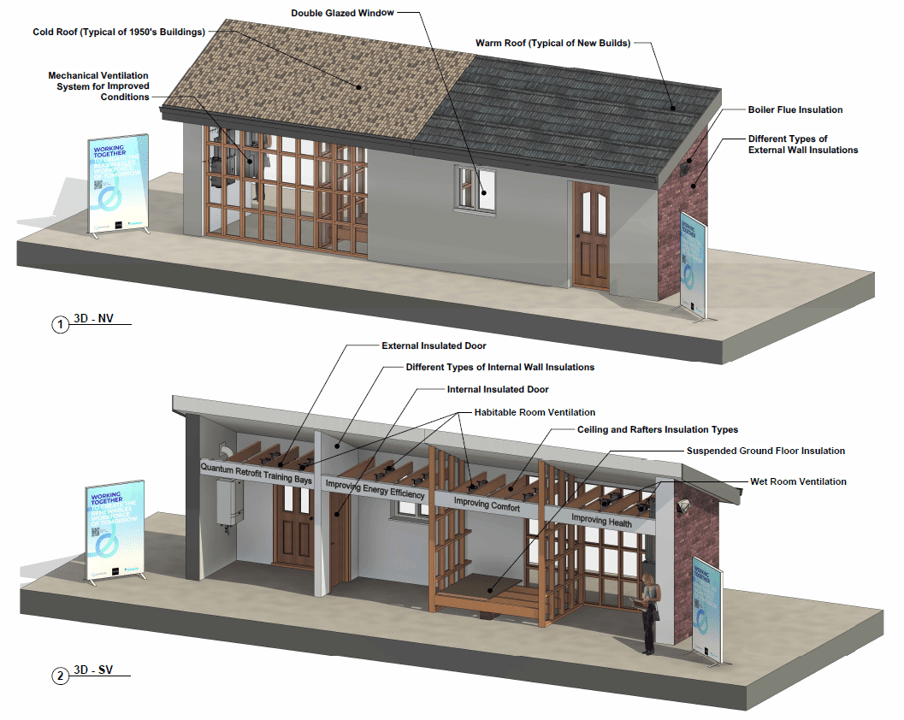Introduction
As the UK strives to meet its ambitious Net-Zero carbon goals, the urgency for a comprehensive retrofit of the nation’s housing stock has never been more critical. With approximately 20% of UK greenhouse gas emissions stemming from housing, over 200 local authorities have declared a climate emergency, emphasizing the need for immediate action.
Retrofitting better insulation and sustainable heating systems into the UK’s homes is essential for reducing emissions and enhancing energy efficiency.
The first milestone is to ensure all homes achieve a minimum Energy Performance Certificate (EPC) Band C by 2030, yet over 70% of the housing stock currently falls short of this standard, including many of the 4 million social homes. By 2050, the goal is for all homes to be net carbon-zero.
At Quantum Group, we recognize the importance of equipping the workforce with the necessary skills to meet the UK’s net-zero targets through our Retrofit Training Bays.
Retrofitting involves integrating new systems designed for high energy efficiency into buildings, ranging from simple energy-efficient light bulbs to advanced heating systems. This process not only lowers energy consumption but also increases property value and reduces environmental impact.
Through our Retrofit Training Bays and partnership with NOCN on retrofit courses, we aim to support this transformative challenge. In this article, we explore the current landscape of the retrofit industry, the anticipated job creation it promises, and the imperative for training and education to support this vital endeavour.
How Many People the Retrofit Industry is Employing?
The UK’s ambition to retrofit its housing stock in alignment with Net-Zero carbon goals could support up to 500,000 jobs each year. By decarbonizing the nation’s 29 million homes, emissions would be reduced, living costs could decrease, and energy security would improve. However, a shortage of skilled workers poses a significant challenge, potentially hindering this effort.
Demand for Skilled Workers
According to PwC’s latest report in the Green Jobs Barometer series, titled “Green Skills as an Enabler of UK Retrofit,” the annual demand for new tradespeople in retrofitting could range from 10,000 to 66,000, particularly for heating engineers, glazers, and insulation specialists.
Additionally, the retrofit sector will require many other green jobs, such as coordinators, office staff, and marketing roles, alongside those needed in manufacturing and distribution.
PwC estimates that building retrofits could support nearly 580,000 jobs annually, with around 94,600 of these in trades, especially heating engineers and plumbers. The primary challenge lies in effectively training workers as demand increases, given the scale of retrofitting required for the UK’s ageing and energy-inefficient homes.
Investment in Training
Nick Forrest, the UK Economics Consulting Leader at PwC, highlights that the UK has not invested sufficiently in skill development for the green retrofit sector. Currently, few recognized technical education pathways exist, with most training being conducted on-the-job in a rushed manner. Small and medium-sized enterprises, crucial to the construction industry, need stronger incentives to invest in training, as the opportunity cost of time spent away from paid work is significant.
Retrofit measures can be categorized into four levels: Shallow (basic insulation), Medium (triple glazing and heat pumps), Deep (solar panels and other adaptations), and Deep+ (replacement of appliances with energy-efficient models).
Barriers to Training the Future Workforce
There are several barriers to training the workforce needed for such extensive upgrades. Demonstrating the demand for retrofitting is essential to attract workers, as the long-term government targets must be supported by solid public and private financing to make the sector appealing.
For instance, in 2020, only about 1,800 heat pump installers were available compared to 130,000 fossil fuel boiler installers, indicating a substantial gap in capacity. Research suggests that around 80% of the fossil fuel boiler installers could either transition to heat pump installation or are willing to reskill, provided that adequate training programs are available.
Homeowners stand to benefit significantly from retrofitting, including lower energy bills that can offset initial costs, alongside social and environmental advantages such as improved air quality and reduced fuel poverty.
The report urges the national government to create an environment that incentivizes private sector involvement, while local governments can leverage community trust and local insights to address specific challenges.
Moreover, the construction and training sectors need to collaborate in developing new educational pathways for both school leavers and adult learners, investing in training programs, and encouraging individuals to gain skills in green retrofit technologies.
Financial Incentives
Nick Forrest emphasizes that while retrofitting can lead to reduced energy costs for homes, the upfront costs can be daunting. The government has allocated £6.6 billion during this parliamentary term, focusing on those in most need, but insufficient financial incentives across different market segments are hindering broader adoption.
Dan Dowling, PwC’s Net Zero and Sustainable Cities Leader, argues for a shift in the narrative around retrofitting. Many homeowners perceive energy measures like solar panel installations as more straightforward and affordable compared to comprehensive retrofitting, which can significantly enhance energy efficiency.
To address this, a “fabric first” approach, prioritizing insulation, is essential. The UK currently loses heat more rapidly than its European counterparts, and significant changes are required.
To meet net-zero targets, a high level of coordination and policy incentives is crucial. Even with immediate funding to elevate all homes to at least EPC D ratings, a qualified workforce would still be lacking.
The Green Jobs Barometer reveals that there is considerable potential in the UK for improving energy efficiency in homes while simultaneously upskilling workers and generating new jobs, which can drive economic growth and support the transition to net zero.
How Much Retrofit is Expected to Scale in the Next 10 to 20 Years?
The Global Retrofit Index highlights that the UK, like many countries, faces a significant challenge in improving the energy efficiency of its existing buildings. To meet climate goals, particularly achieving net zero emissions by 2050, the UK needs to dramatically increase its building retrofit efforts.
Currently, the UK is far from achieving the required retrofit rates. The International Energy Agency (IEA) suggests that to stay on track, the UK must aim for a retrofit rate of at least 2.5% per year by 2030. This represents a substantial increase from current levels, which are estimated at around 1% per year.
Over the next decade, the focus will need to be on several key actions:
- Increased Retrofit Rate: The UK must elevate its annual retrofit rate from 1% to 2.5% by 2030. This means retrofitting more homes and buildings each year to improve energy performance and reduce emissions.
- Enhanced Energy Performance: The energy intensity of buildings must decrease significantly, aiming for a 45% reduction in energy consumed per square meter by 2030, based on 2020 figures.
- Investment in Efficiency: There should be a tripling of investment in energy efficiency improvements by 2030 to support these ambitious retrofit goals.
- Addressing Older Buildings: Many existing buildings in the UK are quite old, which directly impacts their energy efficiency. The age of a property is a critical factor in its performance, highlighting the urgency for retrofitting older housing stock.
Overall, the UK must adopt bold strategies and innovative funding models to ensure that retrofitting is scaled effectively over the next 10 to 20 years, making substantial progress toward its net zero targets.
Our New Retrofit Training Bays
Our Retrofit Training Bays emphasize a Fabric First Approach to Retrofitting. Through hands-on experience, learners will engage in essential insulation techniques that are critical for energy-efficient upgrades. Key tasks include:
- External Wall Insulation (EWI): Learners will install EWI systems on OSB boards, mastering surface preparation and application methods. They’ll gain practical skills in insulating walls around obstacles like downpipes and gas meters.
- Internal Wall Insulation (IWI): This training covers the installation of internal wall insulation, focusing on fitting insulation boards and finishing techniques. Learners will also practice insulating around various features.
- Loft Insulation: Practical exercises will guide learners in laying insulation materials effectively in loft spaces.
- Solar PV Panel Installation: Hands-on training will provide learners with the skills to install solar photovoltaic panels, covering various mounting options.
- Mechanical Ventilation with Heat Recovery (MVHR) Installation: Learners will install and commission MVHR systems, gaining insight into advanced ventilation solutions.
These training opportunities are designed to equip learners with the necessary skills to meet the growing demand for retrofitting.
Here you can see our design for the Retrofit Training Bays:

Our Involvement in NCC Campus Retrofit Bays
Quantum has played a vital role in the development of Retrofit Training Bays at NCC campuses. These bays will provide hands-on training in sustainable retrofitting practices, ensuring that the next generation of skilled workers is prepared to tackle the challenges ahead.
By simulating real-world environments, the Retrofit Training Bays allow learners to engage with practical scenarios that reflect current industry challenges. This experiential learning approach not only enhances their technical skills but also fosters critical problem-solving abilities essential for success in the retrofit sector.
Through this initiative, Quantum aims to equip trainees with the knowledge needed to meet the growing demand for sustainability in the built environment.
NOCN Retrofit Courses
Quantum’s Retrofit Training bays will work hand in hand with NOCN Retrofit courses. This partnership with NOCN Group is a natural extension of Quantum’s commitment to sustainability.
By offering regulated courses that focus on net-zero technologies, Quantum aims to provide learners with the skills they need to thrive in a rapidly evolving industry. These courses will be accessible to a wide range of learners, from new entrants to experienced professionals looking to upskill in sustainable practices.
The partnership between Quantum and NOCN Group is expected to have a significant impact on the built environment sector, providing the skilled workforce needed to drive the UK’s net-zero goals. By equipping professionals with the latest skills in sustainable technologies, this collaboration will help to accelerate the adoption of green practices across the industry.
Moreover, the partnership sets a new standard for vocational training in the green economy. As more industries recognise the importance of sustainability, there will be a growing demand for regulated courses that offer both technical knowledge and practical skills. Quantum and NOCN Group are well-positioned to meet this demand, offering courses that are not only relevant to current industry needs but also adaptable to future developments in green technology.
As we launch our Retrofit Training Bays, Quantum is dedicated to empowering the next generation of skilled workers in the retrofit industry. By providing hands-on training and comprehensive education through our partnership with NOCN, we aim to equip learners with the necessary skills to lead the charge in enhancing energy efficiency across the UK.
Our commitment to upskilling not only addresses the current workforce shortage but also helps shape a sustainable future, ensuring that our homes meet the ambitious net-zero targets. Together, we can build a greener, more energy-efficient tomorrow.



